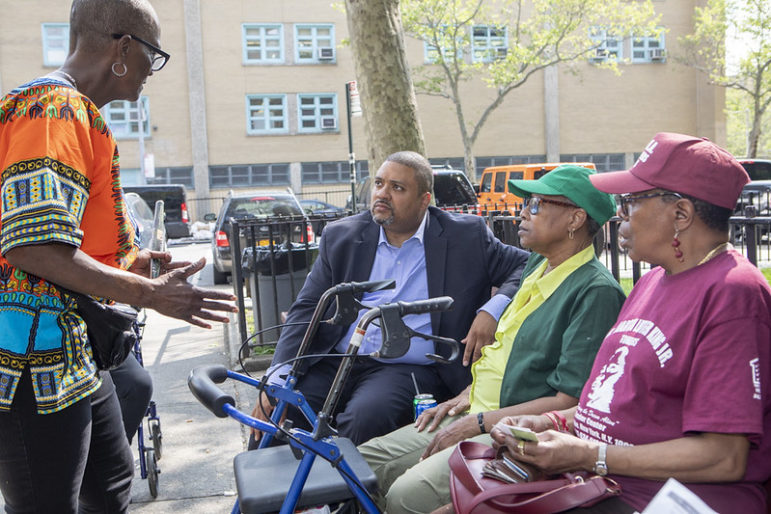Alvin Bragg says prosecutors need to use criminal laws and surveillance techniques—and be willing to put employers behind bars.

Bragg for DA
Alvin Bragg, a former deputy to the state attorney general now running for Manhattan DA, says prosecutors must be willing to use criminal investigative techniques and incarcerative sanctions to address workplace wrongs.It’s the stuff of mob movies and murder mysteries: visual surveillance, witnesses wearing wires and prosecutors wielding the cudgel of prison time to get defendants to do the right thing. If Alvin Bragg wins the crowded election for Manhattan district attorney, those tools might become part of a beefed-up effort to police wage theft and other crimes of the workplace.
Bragg, who until recently was a top deputy to the state attorney general, on Thursday released a white paper outlining an “economic justice initiative” that aims to harness the power of the DA to address what the candidate calls “asymmetries of power” that drive wage theft, workplace harassment and safety violations.
“This is where the law can do lots of good,” Bragg tells City Limits. “Right now in this moment with people clapping for folks who are working in our grocery stores, working in retail and food services … there are employers that we know in this moment—right now—who are exploiting people.”
The paper is the latest meaty policy proposal to emerge in the race for Manhattan DA, which will largely be decided in the June Democratic primary.
A wider lens
In his time with the state AG, Bragg helped supervise multiple cases against employers alleged to have stolen their employees’ wages, including a home-healthcare agency and a Papa John’s franchise. He recalls one press conference where an airport worker and wage-theft victim addressed the significance of the payment he was due to receive from his employer. “He said, ‘This is not like a windfall. It’s not like I hit the lottery. This is my money. It was owed to me. And I’m getting it back.’”
The current DA, Cyrus Vance, Jr., has gone after wage theft, too, sometimes in tandem with the attorney general. Last year, the state Department of Labor and Vance’s office announced an investigation that led to a contractor paying $6 million to welders and iron-workers who’d been cheated out of pay.
Given the suspected size of the wage-theft problem—one estimate is that employers scam New York workers out of $3 billion a year—Bragg says Vance simply has not done enough. “[Those cases] are really limited to the construction trades industry, which is important, but not to the exclusion of building services workers, car-wash workers, fast-food workers, home health aides,” Bragg says. “This is a problem that is not limited to one type of work arrangement or to one industry or sector,” although, “It is concentrated in low-wage industries.”
Bragg says he would create a Worker Protection Unit within the DA’s office to focus on workplace crimes. The WPU would partner with other regulators, nonprofits and unions to find and pursue cases. And it would provide “culturally sensitive, accessible, and robust victims’ services, with appropriate language access” to try to convince more people who suffer wage theft to actually report it.
One obstacle is overcoming the fear that keeps undocumented immigrants from reporting the crime. While immigration status is not always a factor, “that dynamic is a big driver in many of these cases. We have had some folks who, knowing someone’s immigration status, took advantage of that,” Bragg says. This challenge has grown larger during the Trump administration, increasing the suspicion that any government office poses a risk—even an agency that has wrestled an employer into paying restitution. “They don’t even want to come and get the money from your office.”
The WPU would use criminal laws—like larceny, fraud and false reporting—to go after employers who cheat or misclassify their workers, and witness-tampering laws to punish employers who retaliate against workers who’ve complained about wage theft. The unit would also focus on workplace safety violations, sexual misconduct in the workplace, child exploitation and workers compensation crimes. Reckless endangerment charges, for instance, might be brought against firms that tolerate unsafe workplaces.
“The tools are there as a matter of law,” Bragg says. That means “using the kind of tools that we think of in other areas to crack open these cases,” like surveillance of workplaces and audio recordings of players in the case.
Using criminal laws as opposed to labor laws to police wage theft raises the possibility that someone will go behind bars if found guilty—at a time when the general thrust is moving away from the use of incarceration. Bragg acknowledges that is a possibility, but says it is just one of several considerations in determining how to approach each case. “You have to think about the ultimate goal of getting the wage back. That might mean keeping the business a growing concern,” he says. The mechanics of the case also matter. Criminal cases could take longer, or require workers’ testimony. It cannot be a one-size-fits-all approach, Bragg says.
Large field, unsettled race
The field running for DA recently shrank as Janos Marton, a lawyer and advocate who helped lead the campaign to close Rikers Island, suspended his run. Along with Bragg, the race now includes Tahanie Aboushi, Liz Crotty, Diana Florence, Lucy Lang, Eliza Orlins, Dan Quart and Tali Farhadian Weinstein. There is no runoff provision or ranked-choice voting in the contest, so any plurality—no matter how small a share of overall votes—wins.
One name not on that list but a major factor in the race is Vance, the incumbent since 2010. Rocked by criticism of his handling of the Harvey Weinstein case but buoyed by the national significance of his Trump investigation, it is unclear if Vance intends to run to keep his job. Were he to jump in, it is likely the field would thin.
Money is another key element in the race. Marton cited his inability to gather enough cash when he withdrew. Weinstein, a veteran prosecutor, is married to a hedge-fund magnate, who under New York State law could provide unlimited funds to her campaign.
Amid a political atmosphere that favors criminal justice reform and efforts to address historic disparities, and with such a large field confronting voters, an even bigger factor could be which candidate finds favor with the organized left. With candidates largely agreeing on what they won’t do (e.g., perpetuate racial disparities, or contribute to mass incarceration), the contest for the progressive lane could depend on ideas for how to use the powers of the DA’s office to achieve broader social good. Hence Florence’s early focus on affordable housing, Lang’s agenda on elder rights and Bragg’s new proposal on workplace justice.
Among the other DA candidates’ published material, Aboushi briefly addresses wage theft as an element of her platform on protecting immigrants, while Florence has already proposed a Labor Bureau Initiative of 25 lawyers that would “investigate wage theft, prevailing wage violations, health and safety violations, payroll tax fraud, unemployment insurance fraud, union benefit fraud, worker’s compensation insurance fraud, labor trafficking, sexual misconduct in the workplace when it crosses the line into sexual assault, and other workplace abuses.”









